|
In the midst of suffering and oppression by the dictators of Burma, there is also good news. This is true all over Burma, and as we traveled through Karen State on this last mission, I was struck by how many good things are happening.
In many areas that before had been emptied of people by the attacking Burma Army, there were now re-established villages with rebuilt schools and churches.
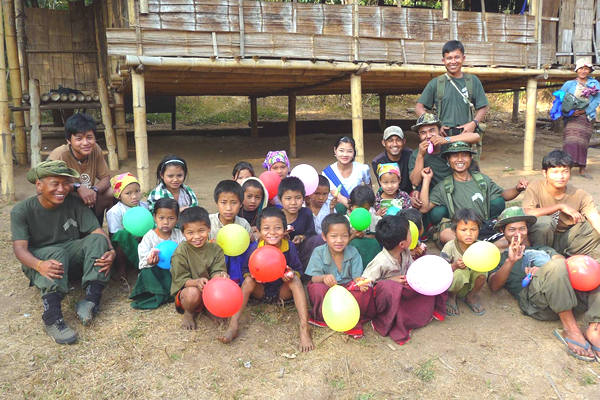 |
| Children and team members enjoy themselves following Good Life Club program |
In one valley that was laid to waste by the Burma Army, two villages have been re-established, as well as a clinic, school and two churches. The KNU (Karen National Union, the ethnic pro-democracy resistance in this area) has built a sprawling community of homes, bamboo offices, sports fields, barracks, and food depots. Almost every organization that assists the Karen people has offices here. Everywhere we went we met hopeful people who continued to work their fields, and, as soon as the Burma Army slows down its operations, they move back into their own villages. While it is true that at any moment the Burma Army could mass enough troops to push the people out, in many areas the Burma Army have yet to do this.
THIS IS DUE TO THE TENACITY AND RESILIENCE OF THE PEOPLE AND THE EFFECTIVENESS OF THE RESISTANCE
The resistance and villagers work together to slow down and in some cases even stop Burma Army attacks. The ability of the people here to continue to survive and thrive is amazing. With no or very little outside support they hide their food supplies, prepare hiding places, find food where they can, raise and educate their children and rebuild their homes and villages when the Burma Army finishes its operations. When the Burma Army troops have passed by and are out of the immediate area (although they still may be only a few hours away on foot), the people go back to their fields, barns and houses to gather any food supplies or belongings they can. They also go to hiding places where they have stored food for such an emergency. The people are prepared year-round to flee and hide and survive.
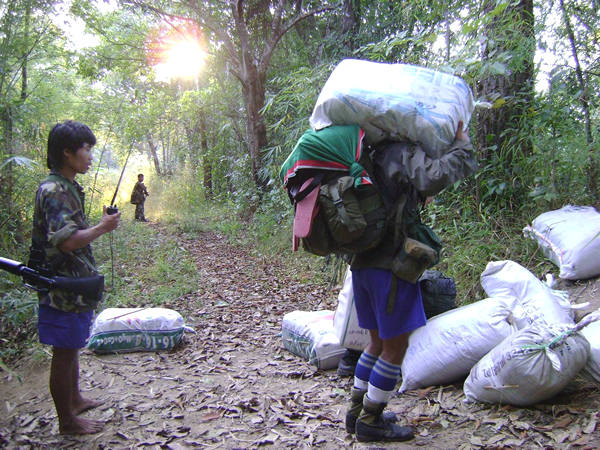 |
| Karen resistance providing security and moving relief supplies during road crossing |
Preparation comes at two levels:
First and most importantly, the people help themselves. The Burma Army has been attacking them for over 60 years as a succession of military dictatorships tries to control everyone in the country. On their own initiative villagers make preparations. Rice is put aside and hidden in different places in the jungle. Hiding places for valuables and people, as well as escape routes, are pre-selected.
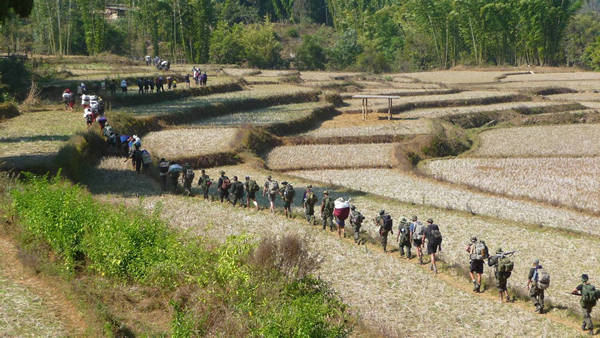 |
| Relief teams and supplies moving to areas recently under attack |
The second level of preparation is from the ethnic pro-democracy resistance.. These governments represent their people and stand for freedom, ethnic rights and democracy. They attempt to protect their people, provide early warning of attacks, and help conduct political, humanitarian, social and educational programs as well as facilitating support for these needs from outside sources.
The ethnic people continue one of the most positive acts of civil disobedience in Burma. They are building up their people, culture, land and freedom.
The Burma Army is faced with both the armed resistance and with men and women and their families who do not easily give in. The story below about two young mothers who choose to live with their families in an area under direct Burma Army threat illustrate the determination, faith and ability of the people.
TWO SISTERS, NAW MOO EH AND NAW ROSEMARY, TELL THEIR STORY
“After you all left that first time we met in 2006, the Burma Army continued their attacks and we had to keep fleeing.
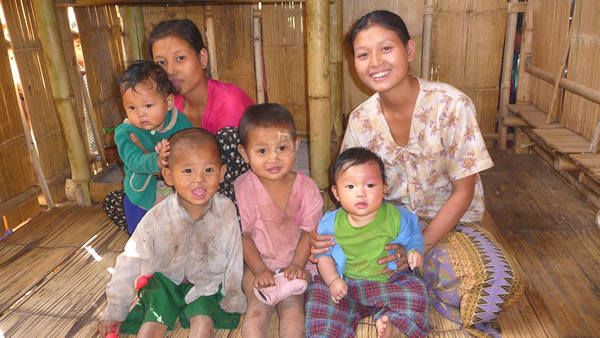 |
| Naw Moo Eh and Naw Rosemary with their children |
“The teams helped us and our organization helped us, but eventually we had to leave to another district. We always were yearning to come back home, and praying to be able to come back. We didn’t want to go to a refugee camp, and there was nowhere we could stay and work the fields. Everyone was suffering, and some could share their food with us and some could not. The Burma Army continued to attack and shell the villages and fields in our district, and we kept praying. Some friends were killed and some were wounded. We were tired, hungry, and afraid. Sometimes the Burma Army shelled every day. Our father is very old, and also did not want to, nor could he, walk to a refugee camp.
“We continued to pray, and we cried out to God to help: ‘please let us stay in our home’. Finally after praying, we all felt we should try to go home. We heard the attacks had subsided, and even though there were new Burma Army camps in the area, we wanted to try. So we prayed and went in faith. We had no food, but we trusted God would provide something for us. We felt very sure He was helping us to come back. As we moved back to our old area, we realized we could not go back to our old village and farms, as they were now directly under a new Burma Army camp, so we climbed over a ridge and down into another valley, and to our amazement came to a field full of rice that had not yet been harvested. We found out that the owners of the field had fled before they could harvest, and would not be coming back, and that the farm was now abandoned. We began to harvest the rice and thanked God that we could now eat. Since then we have been back here, and we thank God and we thank you all. We have rebuilt our village. This is our home. Thank you so much for coming and for your help”.
The faith of these two young mothers gave us all hope and strength and reminded us of God’s presence.
A NEW SCHOOL FOR A NEW GENERATION
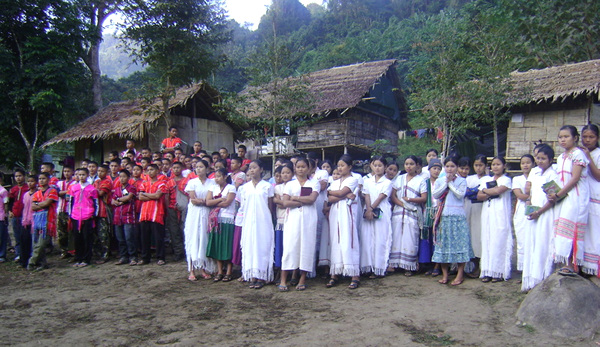 |
| Students from New Generation School gather close to their school |
In an area once empty now stands a school. Unlike most schools in the area that are made of bamboo, the school buildings here are made of wood, with wood shingles and carved wood signposts. This is a tremendous investment of resources and time all at the risk of loss to the Burma Army. It shows the dedication of the local people to give their best for the future of their children. The school is a home for boarders from all over the district and is the cooperative effort of many villages. They receive very little outside support and instead rely on the local communities for all that is needed for the school.
The school has two soccer fields, multiple buildings and a working farm including livestock. Spending the night here, eating good food and listening to the students sing, was a beautiful and uplifting experience.
“BEFORE I WOULD ONLY DIE FOR KACHIN BLOOD, NOW I WILL DIE FOR ANYONE IN BURMA.”
On this relief mission we had teams from seven ethnic groups working together- Chin, Arakan, PaO, Kachin, Karenni, Shan and Karen. Their cooperation was another example of the unity of effort for freedom that crosses ethnic and religious lines in Burma.
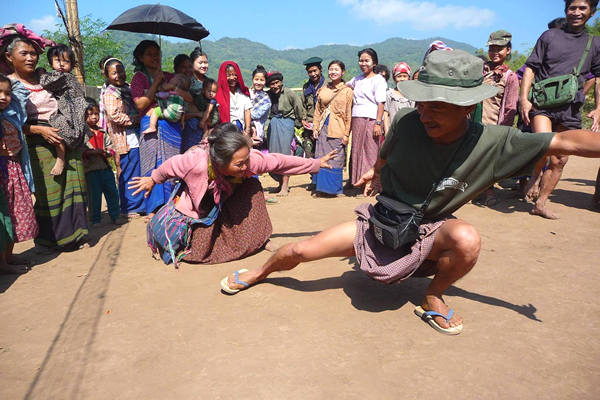 |
| Pa O team member teaches traditional dance to Karen grandmother |
When asked about the situation back in Chin State, the Chin team replied, “There is always a way to work around the SPDC. It is dangerous, they try to stop us, but we pray and find a way. We have hope for change and will continue doing our part. We are happy to do this work.”
The Arakan team leader said, “It is always possible to help the people. Sometimes it is dangerous but the people need our help and assist us in this-so we are all working together.”
The PaO team said that in their area they could do many good things and they felt change would surely come. They saw no reason to give up. “We feel this is a good way to lead our lives and we believe that this work is good for our people, so we will try.”
The Kachin team members said that even though it is difficult to work in their area due to the ceasefire and presence of Burma Army, there is always a way, and when they are blocked from helping Kachin people, they can then help other people.
The Karenni team medic said, “We are now glad to be able to help Karen people here and when this mission is over we will go back to our own areas to do a relief mission. You know our leaders have done a good job of building relationships among villagers under the Dictators’ control and we can go to many places. The people are always glad to see us.”
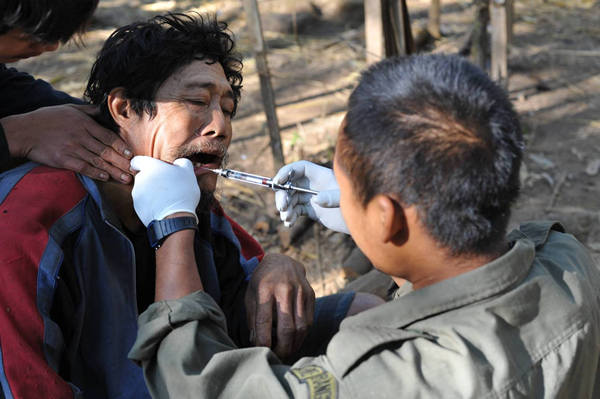 |
| Karen medic treating dental patients in Muthraw District |
The Shan who were also with us on this mission volunteered to stay longer in Karen State to help with a follow on mission in an area of need. They have learned enough Karen to communicate and the medic never seems happier than when he is surrounded by patients. He sits in the middle of a group of people and always looks up with a smile and a look on his face that seems to say, “I am overwhelmed but I am trying my best and I like this very much”.
The Karen teams, for their part, were very good hosts and introduced the other ethnic teams to gatherings at the various stops in the mission journey. These were opportunities for the ethnic teams to sing a traditional song or dance a traditional dance for the villagers and those displaced. Everyone loved it and friendships were built across ethnic lines.
As one Kachin team leader told us; “Before I would only die for Kachin blood, now I will die for anyone in Burma.”
“WE ARE ALREADY IN TROUBLE EVRYDAY…DON’T WORRY FOR US…YOU JUST KEEP COMING AND TELL THE WORLD ABOUT US”
While on this mission we were grateful for the help of people in the plains who helped to move relief supplies, support the resistance and put a light on activities of the Burma Army. When we asked them, “Aren’t you worried you will get in trouble helping us?” they answered, “We are already in trouble every day from the Burma Army. No, don’t worry for us, we will do our part to help. You just keep coming and tell the world about us.”
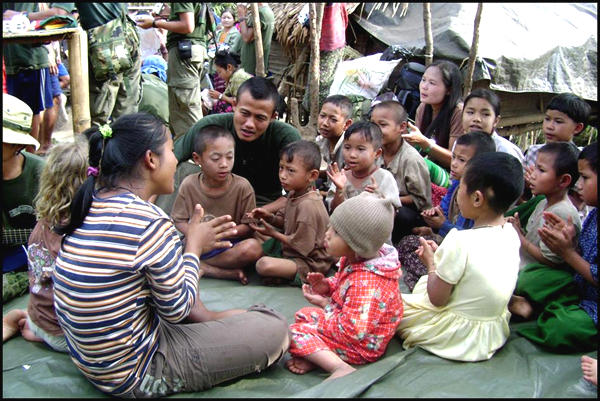 |
| Children’s program in Nyaunglebin District. Dec. 2008 |
These are just a few of the good things we saw on this last mission that give us hope.
We want people to get to know the people of Burma and to love them. We want you to know that they are beautiful people; with all the good and bad qualities we humans share, but who under pressure have chosen to try to live for what is best.
With or without our help, they will not give up and will keep, as they say, “Brightening the corner where we are”.
May those of us who feel led join them in making all of Burma brighter.
God bless you,
A Relief Team leader
Free Burma Rangers
